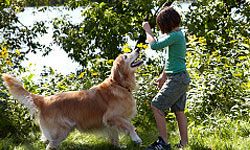 “One of the easiest tricks for a child to teach a dog is the canine handshake.Photodisc/Getty Images
“One of the easiest tricks for a child to teach a dog is the canine handshake.Photodisc/Getty Images
While most dogs love to fetch sticks and play hide and seek, Lassie was different. Anyone who has seen the hit 1950s TV show knows that fetching humans was Lassie’s favorite sport, especially when she was dragging Timmy or Paul, Timmy’s dad, back to the scene of a catastrophe.
In season 5, episode 21, Uncle Petrie — who should not be confused with a Nobel Prize laureate — sees dollar signs when Timmy finds a pool of oil on their land. "Lassie," the geezer sneakily says late at night, "show me where the oil is. I gotta see it with my own eyes."
Lassie, being a dutiful collie, takes the dimwitted uncle to the pond of oil. Tasting the oil isn’t enough to convince Uncle Petrie that the liquid is indeed "black gold." For some unfathomable reason, he wades into the muck and starts to sink. "I’m stuck," he tells the dog. "Lassie, you got to go for help. This ought to teach me."
Yes, it should, Lassie thinks. Instead of leaving Uncle Petrie to stew in his own crude, Lassie obediently bounds off to fetch Paul, her tail wagging, her eyes as bright as a black and white television. It turns out the oil came from a busted pipe. No matter. For Lassie, saving the day was tons of fun.
Luckily, making sure your dog has fun doesn’t need to be dramatic or dangerous, especially if you have kids. Dogs and kids love to play with one another. After all, even Timmy liked tossing Lassie a stick every now and then. There are many safe and fun games children can play with their four-legged friends. Just remember these safety tips from the American Kennel Club when your children are playing with Fido, or a 21st-century Lassie:
- Children should treat all dogs respectfully, and respect the dog’s space.
- Dogs love toys and might not like it if you try to take one away.
- If a dog will not drop a toy on command, the child should ask an adult for help.
- A wrinkled nose, or a mouthful of teeth, means the animal feels threatened.
- A wagging tail means a dog is relaxed.
- A well-trained and well-socialized dog is less likely to bite.
- Dogs need to learn obedience commands (sit, stay, come, heel and down are the five basic commands).
- Dogs like to be rewarded for behaving and playing well.
Go to the next page to find out 10 fun games kids and dogs can play together. Fetching humans is not one of them — although it could be.
Contents
- Fetch
- Tug of War
- Blowing Bubbles
- Frisbee Toss
- Hide and Seek
- Over and Under and Through
- Pet Tricks
- Finding the Toy
- Soccer
- Doggie Dancing
10: Fetch
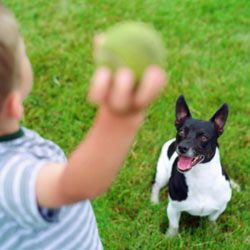 “The trick to playing fetch to use the same toy only for this game, that way the dog knows exactly what’s going to happen.Brand X Pictures/Thinkstock
“The trick to playing fetch to use the same toy only for this game, that way the dog knows exactly what’s going to happen.Brand X Pictures/Thinkstock
"Go get the stick, girl. Go on. That’s a good girl … bring it to daddy. Ivy Sue bring the stick to daddy … bring it here. No I’m not chasing you. Ivy get … get over here."
Ah, fetch, one of the easiest, most enjoyable, and sometimes frustrating games a child can play with a dog. All that’s needed is a stick, a toy or a ball. Fetch is great exercise for the dog and if done correctly, the game teaches both child and dog teamwork [source: Dale].
A few people suggest that some breeds (of dogs, not kids) are better at playing fetch than others. They say that retrieving a ball and returning it is much like herding animals, which some dogs instinctively do. Whether it is like herding or not, fetch is easy to play. The trick is to use the same toy only for this game, that way the dog knows exactly what’s going to happen. Also, make sure your child is giving the dog commands in an upbeat and fun voice [source: Dale].
The correct way to play is for the dog to fetch the stick or ball and return it to their child by dropping it at his or her feet or putting it in their hands. The last step does not come easily to some dogs. That’s why the child needs to teach the dog to "drop it" or "give it." When the dog obeys the commands, make sure your child gives the dog a treat and praises it [source: ASPCA].
Other dogs might retrieve the toy but not return it at all. As most dog trainers will tell you, at this point it’s appropriate to call the dog by name, bring your outstretched right hand across to your left shoulder and say "here." If the dog does not respond, the child needs to say the command again, make the hand gesture and go get the pooch. Eventually something will click and every time the animal hears "here" and sees the arm gesture it will return to you, toy in mouth (hopefully).
9: Tug of War
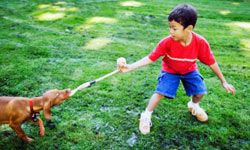 “The tricky part to playing tug of war is teaching your dog to drop the toy on command.Brand X Pictures/Thinkstock
“The tricky part to playing tug of war is teaching your dog to drop the toy on command.Brand X Pictures/Thinkstock
Sophie Lou — Ivy Sue’s older sister — loves to play tug. It’s her game of choice and she’s darn good at it. Tennis ball in the mouth — let’s play tug. Rope toy — c’mon dad, let’s play. She loves to play with her Ivy Sue and her other sister, McBeal. In 10 years, Sophie has never lost a match. She crouches low like a linebacker, sticks her hind quarters in the air, and minimizes her center of gravity. She grabs the toy in her Labrador retriever jaws and shuts them as tight as a vice grip. She pulls with such force that she could rip your arm off if you don’t let go.
For the record: This is not the correct way for your child to play tug of war with their dog. There are a couple of simple rules to follow when teaching your child to play tug, rules that my dog Sophie never learned. (OK, she wasn’t taught.) First, the child should hold the toy with one hand at each end. Have them then tell the dog to sit. When the dog is sitting, have your child wave the toy in front of the animal’s face and say "get it," or "take it." It’s best if the dog grabs the toy from the middle. When the dog latches on, move the toy up, down and sideways [source: ASPCA].
Here’s the tricky part — getting your dog to drop the toy on command. In 10 years, Sophie never mastered this part of the game. She’d rather tug and keep on tugging. If I was stuck in a pool of oil like ol’ Uncle Petrie, Sophie would pull me out like no one’s business. It’s not Sophie’s fault, as our dog trainer has reminded me. It’s my fault. But, I digress. The important part of the game is never shout or frighten your dog when trying to get them to drop the toy. Your child needs to say "give," "drop" or some other command. Give the dog a treat when it responds as it should. After a few times, the dog will get the hint and drop the toy [source: ASPCA].
8: Blowing Bubbles
Dogs will chase anything — cats, other dogs, cars — even bubbles. Having your child blow bubbles for the dog to catch is a fantastic game for smaller children who are 3 to 8 years old. And you know what’s cool? They have special flavored bubbles made especially for dogs. Unlike soapy bubbles, these edible bubbles won’t give Fido an upset stomach [source: ASPCA].
If your dog is into bubbles, then chances are they’ll really be into chasing water from a hose or water gun, especially one of those Super Soakers. Tell your child that once the dog stops chasing the water or bubbles that it’s time to stop playing — and never squirt the hose or water gun in the dog’s face [source: ASPCA].
7: Frisbee Toss
There is something awesome about a dog running full speed, jumping in the air and catching a Frisbee in its mouth. Some dogs seem to jump higher than Lebron James at playoff time. It’s great exercise for the dog, and tons of fun for everyone else. Yet, it’s a hard game to master, but with a little patience your child and your dog will be able to get the game down in no time.
Not all dogs are suited for Frisbee toss. Great Danes? Not so much. Border collies and Jack Russell terriers? Perfect. Your dog should weigh between 30 to 50 pounds, have sound hips and already have the basic chasing and retrieval instincts. According to the Indy Dog and Disc Club there are a few do and don’ts to playing Frisbee with your dog, especially if it’s the first time:
- Begin by rolling the disc on the ground on its side. The Frisbee might smack the dog in the snout a couple of times, but that’s OK. The dog will get used to it.
- When teaching the dog how to play, always use a reassuring and happy voice.
- NEVER throw the Frisbee directly at the dog. Do not hit your dog with the disc. The dog will come to fear the toy and never play with it.
- NEVER push the dog too hard. Have fun, that’s the point.
- Don’t encourage young dogs to leap. They can hurt their legs or hips.
Did you know?
The first Frisbees were pie plates. Between 1871 and 1959, the Frisbie Baking Company of Bridgeport, Conn., sold pies to colleges all over New England. According to a popular legend, Yale students in New Haven, Conn., created a game by tossing and catching the empty pie plates. In 1948 the toy company Wham-O invented a plastic version, calling the plastic disc the Frisbee [source: Yale].
6: Hide and Seek
Dogs and children love to play hide and seek. Moreover, it’s a wonderful game to play indoors. Before playing, the child should get a fistful of treats. The game can then begin. First, put the dog in the "sit" or "stay" position. Let’s hope they have mastered those commands beforehand. If not, hold the dog by the collar for your child.
Once the dog is staying, have your child, treats in hand, hide in a different room. When your kid is tucked away, tell them to call the dog by name once. Wait as the dog searches. Finally, when the dog finds your child, make sure the child lavishes praise on the pooch and gives it a treat. If you really want the dog to get into the game, use chicken or cheese as treats. Every dog loves chicken and cheese [source: ASPCA].
When you first begin playing the game, make sure the dog can easily find your child. Making it too hard will discourage Fido. As the dog masters the game, your child can hide in more difficult locations [source: ASPCA].
5: Over and Under and Through
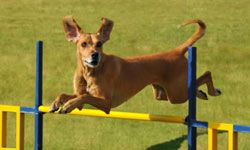 “Navigating the agility course increases a dog’s self confidence and provides a good opportunity for your child to bond with their four-legged pet.iStockphoto/Thinkstock
“Navigating the agility course increases a dog’s self confidence and provides a good opportunity for your child to bond with their four-legged pet.iStockphoto/Thinkstock
Have you ever seen a dog agility competition on TV or in person? The dogs and their handlers maneuver through a series of obstacles including tunnels, A-frames and weave poles. It’s a blast to watch and more fun to do. On the fun scale, agility games are off the charts. Agility is a fast-paced way to instill obedience in the dog. Navigating the course increases a dog’s self confidence while providing a good opportunity for your child to bond with their four-legged pet.
You don’t have to buy expensive equipment to set up your own agility course in your backyard. Your house is packed with things you can use. Just be creative. For example, an old tire tethered to a tree branch can become a great jump if the dog is small enough. The dog can run through an old toy plastic tunnel. A bar jump can be fashioned out of PVC pipe and using a couple of cinder blocks as a base. You can use any type of pole or stick, including plant stakes, as weave poles. You can also use a small table, or even a beach lounge chair, as part of the course [source: Ma]. Hula hoops also work well.
You can even enroll your pooch in an agility program. Most dog trainers will tell you to join when your dog’s body is physically able to go through the rigors of the course and when it’s old enough to understand the basic commands. The dog might have to take Obedience 101 before moving on to agility training.
4: Pet Tricks
 “One of the easiest tricks for a child to teach a dog is the canine handshake.Photodisc/Getty Images
“One of the easiest tricks for a child to teach a dog is the canine handshake.Photodisc/Getty Images
Sometimes teaching a dog how to "shake," "dance," "roll over" or "howl" is a fun way for your child to spend quality time with their dog. Rewards, effusive praise and repetition are the only ways your pooch will learn tricks.
One of the easiest to teach is the canine handshake. Once your dog is in the sitting position, grab its paw and say "paw." Give them a treat. After a few times of doing this, the dog will do it automatically every time you ask [source: Dog Training Guide]. Giving kisses is also nice, although some dogs will do it without even thinking. Put a bit of peanut butter on your face and say "kiss." They’ll understand the command in no time [source: Dog Training Guide].
3: Finding the Toy
Her name is Chaser and she’s one smart pup. How smart? She can understand 1,022 words. Not just any old words such as "sit" and "stay." Oh, no. Chaser knows the names of more than 1,000 objects — mostly toys — and she can go find any one of them at any time [source: The Week].
Chaser’s owner, John W. Pilley, a psychologist at Wofford University in South Carolina, began training Chaser to get the objects when Chaser was a puppy. For four to five hours each day, Pilley repeated the names of one or two new objects. He then hid the toys and asked Chaser to fetch them. Chaser brought the toys back as she was asked [source: The Week].
Of course, no one expects your puppy to understand the names of 1,000 or more toys. Still, your child can teach most any dog — Chaser is a bright border collie — to bring back a particular toy using the repetition, praise and reward scenario. Chaser was so good at playing, that she still wants Pilley to teach her every day [source: The Week].
2: Soccer
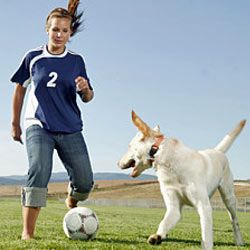 “Your kids and dog will have a blast playing soccer together.Digital Vision/Getty Images
“Your kids and dog will have a blast playing soccer together.Digital Vision/Getty Images
Your dog might not be able to bend a soccer ball like David Beckham, but your child and pet can have a blast playing the game. Of course, dogs use their noses to "kick" the ball around. One way to play the game is for the child and the dog to get the ball away from one another. When playing, it’s important that the dog not be allowed to bite your child’s clothing or shoes. If that happens, just slow the game down and tell the dog to "sit," or "down" [source: Dog Training Academy].
If your kid is really in to soccer, they can teach the family dog how to score a goal. Unlike just kicking the ball back and forth, teaching a dog to kick and score with their nose is a bit more complicated, but it can be done [source: Your Dog Needs You].
1: Doggie Dancing
Your kids might not know that Fred Astaire and Ginger Rogers liked to cut up a rug, or that John Travolta knew his way around the disco in "Saturday Night Fever," but they might enjoy dancing with their dog.
Doggie dancing is one of the newest, and perhaps coolest, activities humans and canines can do with one another. With just one search on YouTube and you can see that it looks like a ton of fun and is quite a craze — one dancing dog video has 10.8 million views. The object is for your child (and you, if you want) to dance with your dog. Whether they’re dancing the rumba, cha cha or the flamenco, the dogs don’t have two left paws like most men.
Doggie dancing takes patience and time. It’s not as easy as fetching a stick. However, doggie dancing lets your child use their imagination as they plan and choreograph the dance steps they would like to do with their pet. There are even doggie dancing competitions, and one lady has the dream of making it an Olympic sport [source: Leider]. She might be barking up the wrong tree.
Lots More Information
Related Articles
- Are Dalmatians good family dogs?
- How to Choose the Best Dog Breed for Your Family
- 5 Medium-sized Family Dogs
More Great Links
- The Humane Society of the United States
- Petfinder.com
- American Kennel Club
- Dog Play
- Cesar’s Way
Sources
- American Kennel Club. "The Dog Listener." (Aug. 19, 2011). http://www.akc.org/pdfs/PBSAF2.pdf
- ASPCA. "Fun Activities for Kids and Pets." (Aug. 19, 2011). http://www.aspca.org/pet-care/kids-and-pets/fun-activities-for-kids-and-pets.aspx
- ASPCA. "Teaching Your Dog to Play Fetch." (Aug. 19, 2011). http://www.aspcabehavior.org/articles/85/Teaching-Your-Dog-to-Play-Fetch.aspx
- ASPCA. "Teaching Your Dog to Play Hide-and-Seek." (Aug. 19, 2011). http://www.aspcabehavior.org/articles/86/Teaching-Your-Dog-to-Play-Hide-and-Seek-.aspx
- ASPCA. "Teaching Your Dog to Play Tug-of-War." (Aug. 19, 2011). http://www.aspcabehavior.org/articles/21/Teaching-Your-Dog-to-Play-Tug-of-War.aspx
- Dale, Steve. "Play Fetch with your Dog." Pet Peoples Place. (Aug. 19, 2011). http://www.petpeoplesplace.com/resources/articles/dogs/192-play-fetch-with-your-dog.htm
- Dog Training Academy. "Doggy Ball Training." (Aug. 19, 2011). http://www.dog-training-academy.com/news/ball-training.htm
- Dog Training Guide. "How to Teach Your Dog Tricks." (Aug. 19, 2011). http://www.dogtrainingguide.com/tricks.htm
- Indy Dog & Disc Club. (Aug. 22, 2011). http://www.d-dog.com/
- Indy Dog & Disc Club. "Frisbee Dog Basic Training Guide." (Aug. 22, 2011). http://www.d-dog.com/Downloads/GettingStarted.pdf
- Leider, Polly. "Sit, Heel, Fetch…Dance!" CBS News.com. Feb. 11, 2009. (Aug. 22, 2011). http://www.cbsnews.com/stories/2006/02/22/earlyshow/contributors/debbyeturner/main1336142.shtml
- Ma, Lanh. "Ideas for Obstacle Toys for Dogs in the Backyard." The Daily Puppy." (Aug. 19, 2011). http://www.dailypuppy.com/articles/ideas-for-obstacle-toys-for-dogs-in-the-backyard/1d9b7d23-c1c2-9009-cb6b-7a61100ad9b7
- The Week. "The genius dog with a 1,022-word vocabulary." Jan. 18, 2011. (Aug. 19, 2011). http://theweek.com/article/index/211166/the-genius-dog-with-a-1022-word-vocabulary
- Yale University. "Landmarks in Yale’s History." (Aug. 22, 2011). http://www.yale.edu/timeline/1920/index.html
- Your Dog Needs You. "FIFA World Cup 2010 Doggy Style." Dec. 30, 2010. (Aug. 19, 2011). http://yourdogneedsyou.com/about/dog-soccer/





























